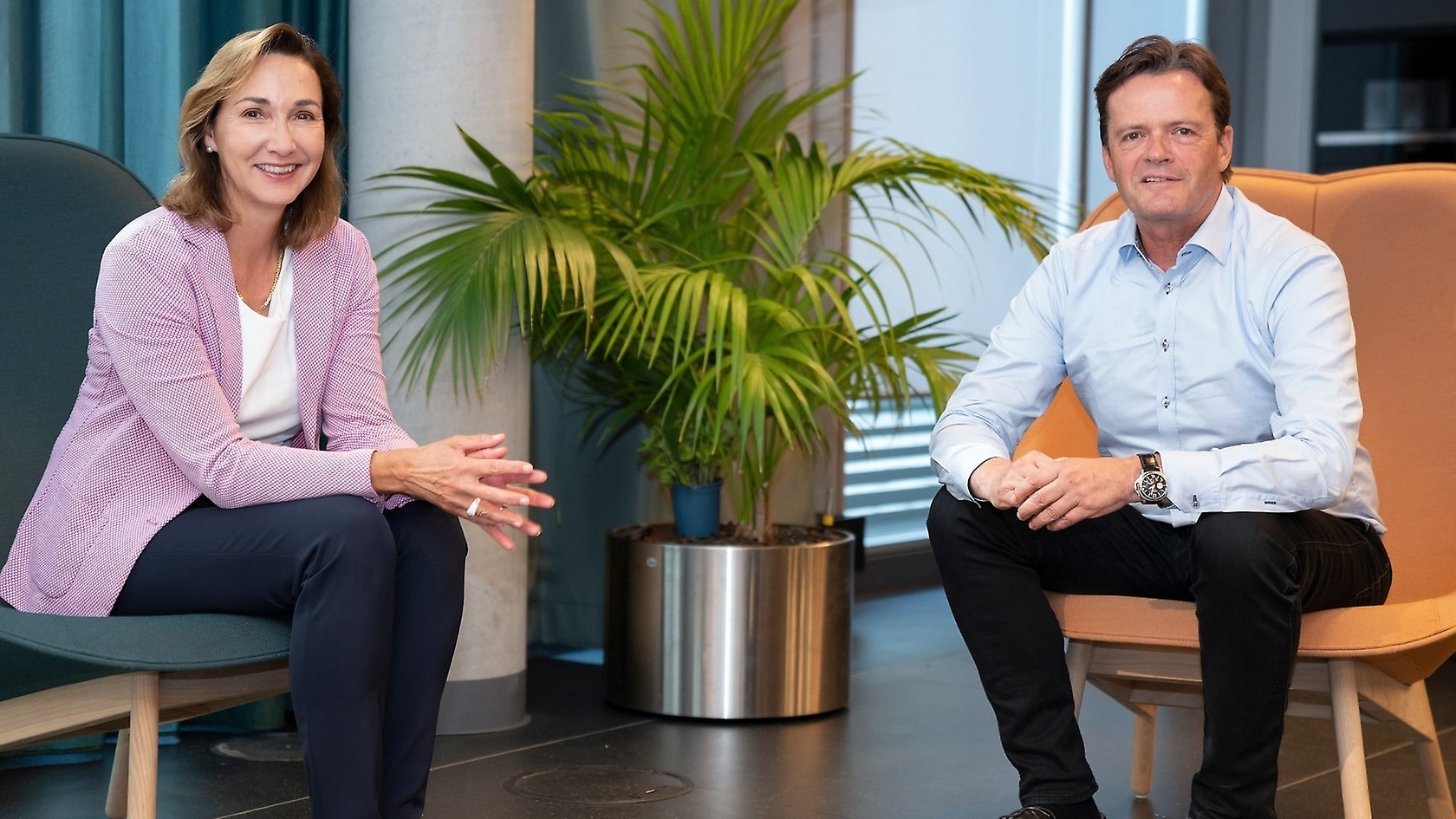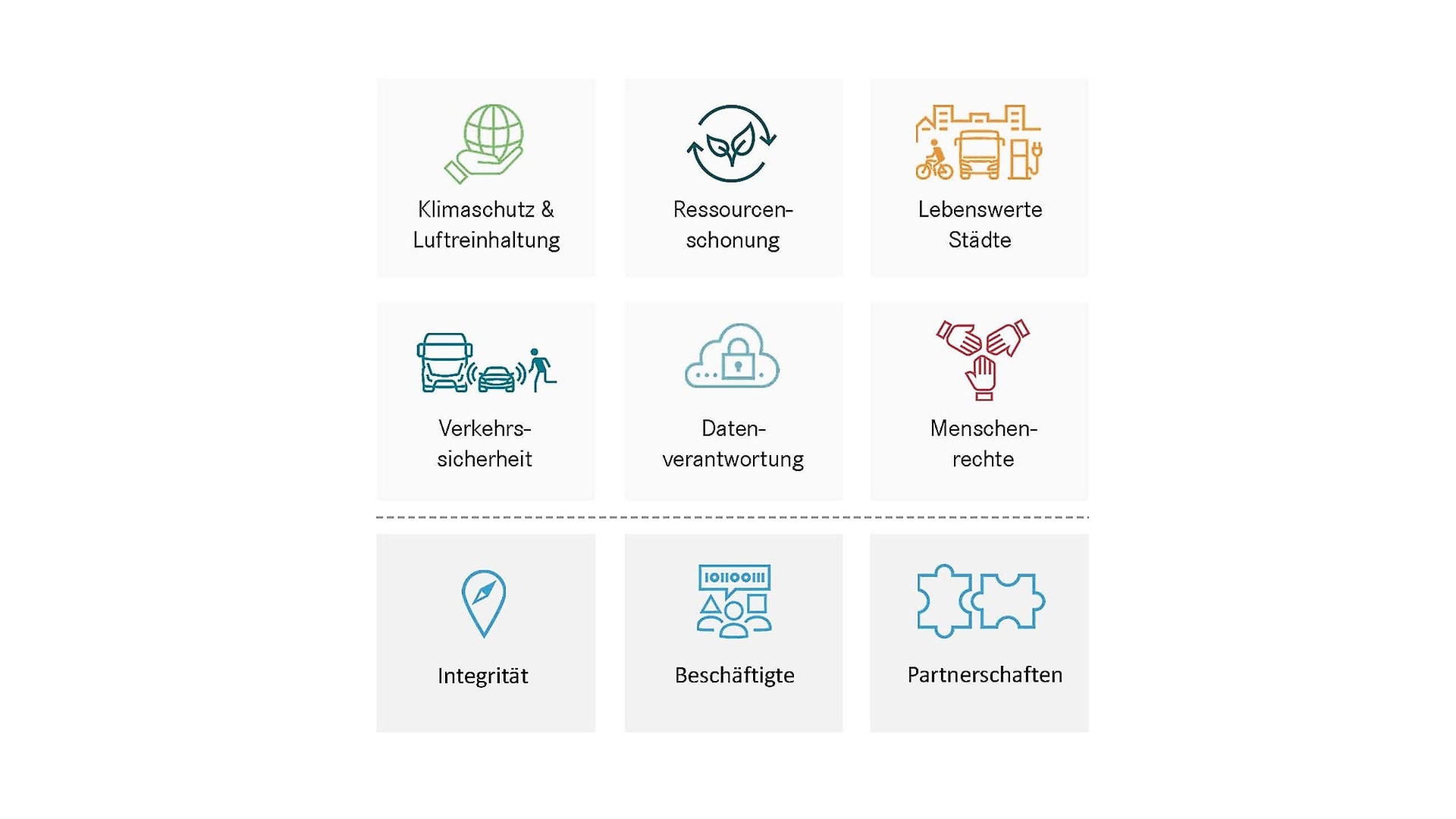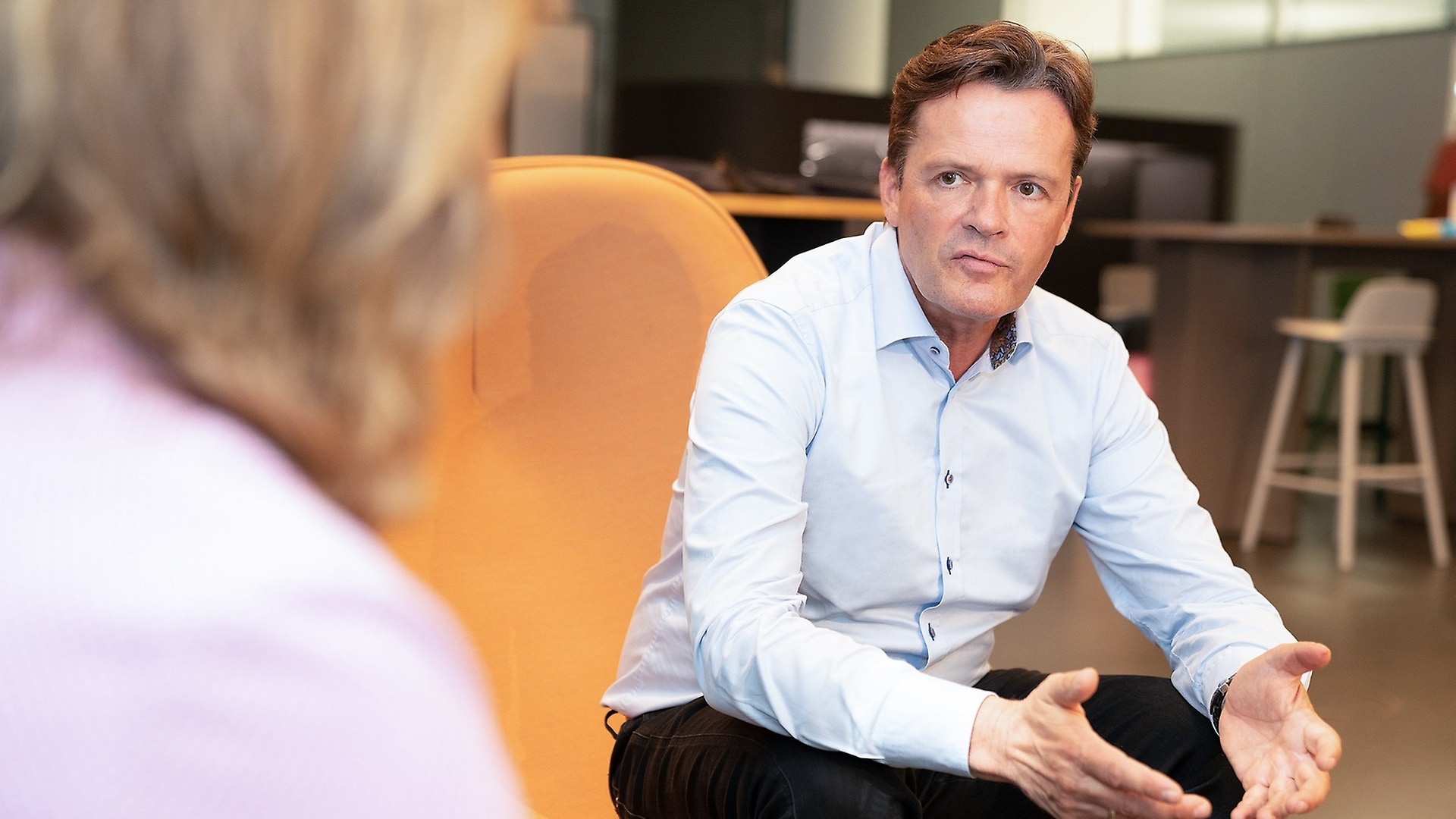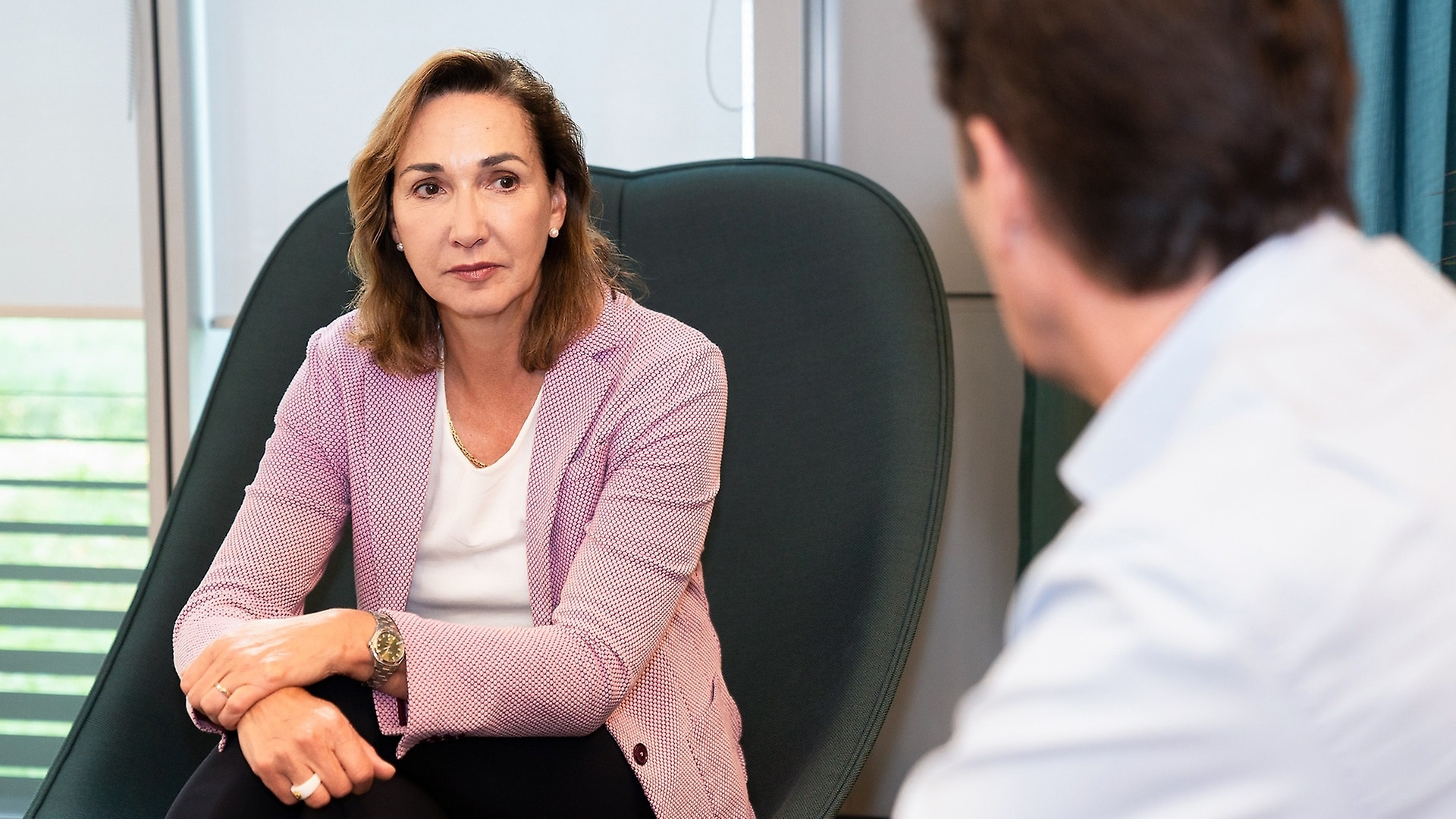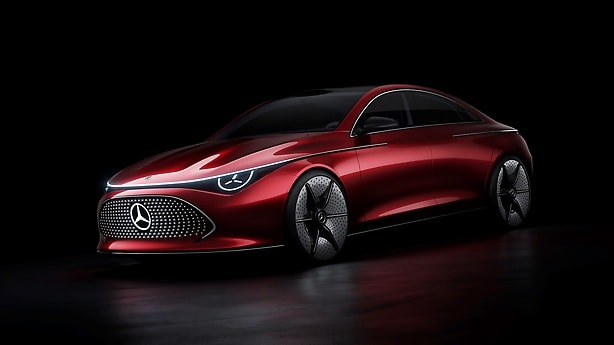“Sustainability is not just a trend”.
October 06, 2020 – Hardly any other topic has experienced such an increase in public discourse in recent years as the topic of sustainability. At the Mercedes-Benz Group, the Group Sustainability Board (GSB) is responsible for the strategic orientation and the management of sustainability activities. We spoke with the two colleagues who are working together as co-chairs of the GSB to further anchor sustainability into the Mercedes-Benz Group's core business: Renata Jungo Brüngger and Markus Schäfer.
What is the significance of sustainability for the Mercedes-Benz Group?
Renata Jungo Brüngger: Sustainability has long since ceased to be a niche topic that must be taken into account for reputational reasons. Sustainability is decisive for our future – that of our planet, but also that of our company. We are a global corporation and thus also bear global responsibility. As such, we aim to achieve economic success in harmony with the environment and society. This is also what our stakeholders – for example, customers, employees, our investors, legislators, as well as politics and society – are rightly expecting from us. And they also expect us to contribute to solving urgent problems such as the climate change. Because sustainability is so important, we in the Group Sustainability Board (GSB) are actively working to anchor the topic in all divisions and business areas.
Markus Schäfer: Sustainability is not just a temporary trend for us as a company. On the contrary, the importance of the topic will continue to grow. We also take this into account as we include sustainability as an essential aspect of our business strategy. We already define sustainability criteria in the earliest phase of product development. We analyze exactly what impact certain decisions have on such things as the future life cycle assessment of a model and how primary raw materials could be saved or replaced by recycled materials. After all, we want to develop models that stand for modern and at the same time sustainable luxury, and inspire our customers – precisely because they have no negative impact on the environment and society in the long term and also offer comfort and safety.
How far are we then at the Mercedes-Benz Group in anchoring sustainability into the business?
Renata Jungo Brüngger: Sustainability is not a goal that can be achieved quickly, but an ongoing process. Here we are on the right track and have defined the action fields that are most important for us at this time. These range from climate protection and resource conservation over data responsibility and human rights to issues like integrity and partnerships. All topics are part of the sustainable business strategies of our three business divisions. That's why we have consciously chosen not to develop a separate sustainable strategy. This is an important signal for the seriousness with which we are driving forward the sustainable transformation of our company. In order to anchor this goal in our daily business, we train our employees with a specially developed sustainability training. Sustainability has to be relived every day, it depends on the contribution of each and every individual.
Markus Schäfer: In this context, we like to speak of a "SpurWechsel", German for lane change, which we have initiated. An important contribution to this lane change at Mercedes-Benz Cars is our Ambition2039. With this roadmap, we already set the most important goals on the way to CO₂ neutrality last year. Our goal until 2039 is a CO₂-neutral new car fleet. To this end, we are planning the electrification in all segments, from the smart to the SUV. By the end of this year, we will have five fully electric models and more than 20 model variants of plug-in-hybrids in the passenger cars portfolio. In addition, purely electric variants in the compact and premium segments, such as the EQS with a projected range of up to 700 km (WLTP), are already in the starting blocks.
Is the electrification of our models the most important contribution to sustainability?
Markus Schäfer: The electrification of our vehicle fleet is essential for achieving the climate protection goals. But resources conservation is also important to us. Our development units are working in many areas on the use of recyclates in series production. In addition, our long-term goal is to decouple our resource consumption from our growth. A central element in this respect is the increased use of secondary materials in our vehicles: By 2030, we are striving for an average share of 40% for the passenger car fleet of Mercedes-Benz. And these numerous changes do not stop with passenger cars. Ambitious climate protection goals are also part of the sustainable business strategies at Daimler Trucks & Buses and Mercedes-Benz Mobility. In this way, each division contributes to the CO₂-neutral mobility of the future.
In order to be able to offer an emission-free vehicle fleet, the vehicles must also be produced CO₂-neutrally – how far is the Mercedes-Benz Group here?
Markus Schäfer: We have already achieved a great deal here. From 2022 on, not only will our European plants be CO₂-neutral, as planned so far, but all of our own Mercedes-Benz passenger car and van plants worldwide. That are more than 30 plants. Our battery production will also be CO₂-neutral worldwide from 2022. A perfect example of a thoroughly sustainable production site is, of course, the "Factory 56", which we planned as a CO₂-neutral factory from the very start and has recently started producing.
The growing electrification of our models also brings another topic into focus – the responsible procurement of raw materials such as cobalt and the sustainable design of global supply chains. How much responsibility can the Mercedes-Benz Group assume here?
Renata Jungo Brüngger: Designing our supply chains sustainably is not an easy task. We have more than 60,000 direct suppliers that, in turn, have sub-suppliers. Sometimes one supply chain has up to seven or eight sub-levels. At one stage, there can be up to 20 sub-suppliers. That is why I like to speak of a supplier network. With this complexity, the first challenge is to create transparency across the supply chains. That's why the dialog with our suppliers is so important for enabling us to deal effectively with aspects such as human rights risks. Another challenge is to examine if our own companies and our supply chains are complying with human rights – in a risk-based and systematic manner. For this, we have developed our "Human Rights Respect System," which deals with this area. In addition, we are also working together with local non-government organizations (NGOs). One example of this is the cooperation with the aid organization Bon Pasteur, with which we are working against child labor in the Democratic Republic of Congo. And, of course, the dialog with politicians and other companies is also important. I will soon be attending a conference of the German Federal Ministry for Labor and Social Affairs (BMAS) in order to present our human rights approach and discuss our experiences with representatives of other companies and the participating federal ministries.
Mr. Schäfer, your board division also includes the responsibility for procurement and supplier quality. What steps is the Mercedes-Benz Group taking in the supply chain in order to minimize environmental risks?
Markus Schäfer: Besides the social aspects, which Renata just mentioned, we of course also take into account environmental issues when it comes to the supply chain. Here we are working closely together with our direct suppliers – also in order to be able to identify and minimize environmental risks at an early stage. We have our most important suppliers evaluated by the organization CDP (formerly Carbon Disclosure Project) regarding their environmental impact. Furthermore, CO₂ and recyclate targets have become an important criterion for the selection of suppliers at Mercedes-Benz Cars & Vans. We have also codified the demand for transparency on relevant environmental key figures in the supplier contracts. Similarly, sustainability also plays an important role in our strategic partnerships in the battery cells segment, like those with Farasis Energy or CATL. In the future, we will procure CO₂-neutrally produced battery cells from both companies.
Finally, let us take a look into the future. What are the next important milestones in the sustainable transformation of the Mercedes-Benz Group?
Markus Schäfer: The coming months will certainly be crucial to successfully launch the next electrified models on the market. They will all contribute to the transformation of the drivetrain system at Mercedes-Benz Cars. The first milestone of Ambition2039 in the product range will already be reached in two years: We are working at full speed to be able to offer several electrified variants in all segments of Mercedes-Benz Cars by 2022. But also the participation in climate protection initiatives that go beyond the automotive industry will continue to challenge us. We have already joined two such initiatives in this year alone: For one, we are a founding member of Transform to Net Zero
Renata Jungo Brüngger: One topic we have not spoken about before, but which will continue to concern us in the future, is digitalization. The world of work is increasingly being shaped by this – as impressively illustrated by Covid-19 at the latest. Data will gain more and more importance. It will be decisive for our future success that we can guarantee a responsible and sustainable use of data. To this end, we have implemented a group-wide Data Compliance Management System. The work on this will continue to challenge us. And when we talk about future developments in the field of human rights, I of course immediately think of the planned human rights due diligence or Supply Chain Law. Legislation can be helpful in creating legal certainty and internationally accepted standards. However, it is important for us that a possible law will also ensure a level playing field in the future as well. It should promote fair competition and strengthen human rights in global value chains in the best possible way – ideally at the international level, but at least at the European level. And, of course, such a law has to be appropriate and feasible. I think that we are well equipped with our consistent commitment to this: Recently, for example, we announced our accession to the Responsible Mica Initiative
